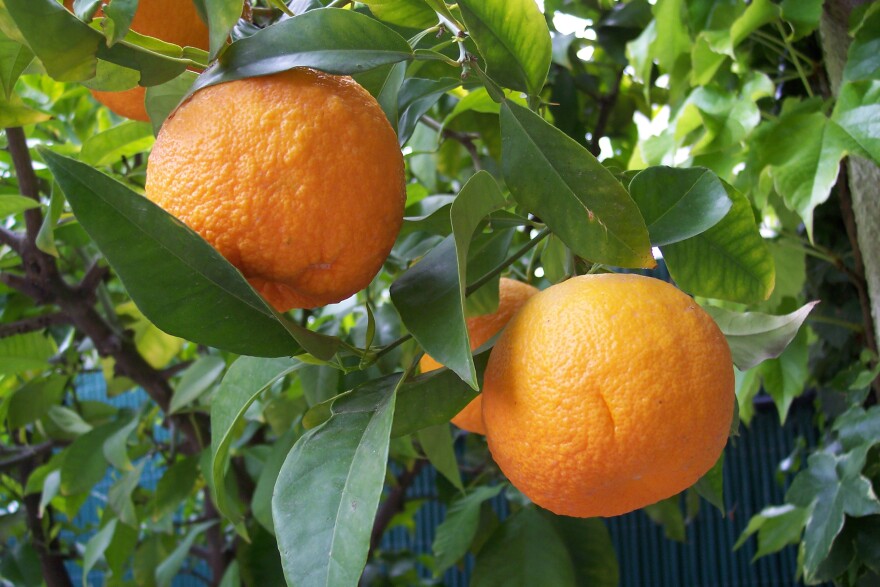Oranges imported to Florida --- primarily from Brazil and Mexico --- are projected to surpass what is grown in the hurricane-damaged Sunshine State this season.The Florida Citrus Commission on Wednesday approved an adjusted $17.8 million budget that takes into account an increase in imports that will help cover crops lost in September to Hurricane Irma.
“With Hurricane Irma's impact on the crop, we would expect imports to rise,” said Marisa Zansler, economic and market research director for the Department of Citrus. “This reflects consumer demand for orange juice.”
Without a timeline, Zansler expects Florida products can recapture the market as the industry recovers from the storm.
“As the Florida citrus industry rebounds, we will see Florida production counter this need, especially as brands look at the benefits, both in terms of quality and economic considerations, of using locally produced citrus over imports,” Zansler said.
The state Department of Agriculture and Consumer Services has projected a preliminary $2.5 billion impact to Florida's agriculture industry from Irma, with estimated losses to the citrus industry at $761 million.
Even before Irma, the industry had suffered steady declines in production because of deadly citrus-greening disease.
A so-called “box” tax that provides revenue for the Department of Citrus isn't being changed for the coming year. But the department expects the tax will now be imposed on 124.34 million 90-pound boxes of oranges, grapefruit and specialty fruits.
When a preliminary $17.5 million budget was set in June, the number of boxes expected to be taxed stood at 106.7 million, which would have been down nearly 12 percent from 120.8 million boxes last year.
Florida growers were projected to fill 69.2 million boxes, of which 61.65 million were to contain processed oranges, under the preliminary budget. Imports were projected in June to account for 37.5 million boxes, almost all oranges.
But after Irma swept through the state, the U.S. Department of Agriculture on Oct. 12 forecast the newly started growing season would produce enough oranges in Florida to fill 54 million 90-pound boxes, a 21 percent drop from the past season.
Shortly before the forecast was announced, Agriculture Commissioner Adam Putnam expressed concern that the storm could increase the sale of agricultural imports in Florida.
Now, the projection from the Department of Citrus is that its revenue will come from nearly 59.3 million boxes of Florida citrus and 65 million boxes of imports.
Oranges will account for 53.7 million of the taxed boxes from Florida and 63.95 million of the imported boxes.
Brazil has accounted for 46 percent of the state's orange imports, followed by 44 percent from Mexico. Costa Rica and Belize are among the other sources of imports.
Most grapefruit imported into Florida comes from California and Texas.
As part of the new budget, the box tax on growers will remain 7 cents on each 90-pound box of processed oranges, grapefruit and specialty fruits.
Last year, the agency reduced the box-tax rates from 23 cents on processed oranges and 19 cents on grapefruit. The reductions had been sought by growers and supported by Gov. Rick Scott.
On Tuesday, the U.S. Senate approved $36.5 billion aid package for states and territories hit by a series of natural disasters in Texas, Florida, Puerto Rico and California. The funding, which awaits President Donald Trump's signature, includes $18.7 billion for the Federal Emergency Management Agency's disaster relief program, $16 billion for the National Flood Insurance Program and about $600 million to battle western wildfires.
However, the package doesn't include money Scott and Putnam sought for the agriculture industry.
U.S. Sen. Bill Nelson, D-Fla., was unsuccessful in attaching a $3 billion proposal for Florida's agriculture on Monday.
U.S. Rep. Tom Rooney, R-Fla., attempted to add a similar proposal to the House package last week.
Putnam expressed hope that such funding could be included in an emergency funding package that is expected to go before Congress in November.
“While I'm disappointed in the lack of support for Florida agriculture in this current legislation,” Putnam said in a statement Tuesday, “I'm hopeful that the commitment to an additional emergency funding measure next month comes to fruition, so Florida agriculture can recover.”




